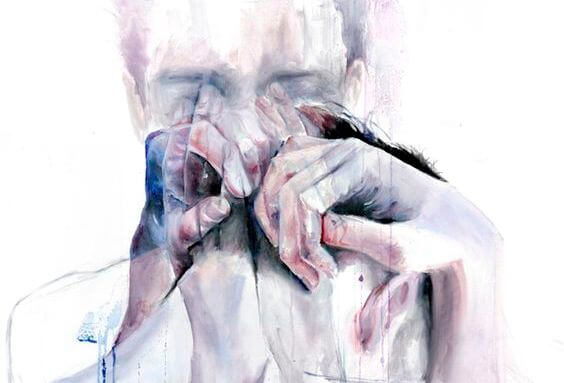Emotional Crying: Medicine To “Drain” The Soul

There are those who cry silently, for a brief moment, and in discrete solitude. However, the only way to restart, to drain our sadness, frustration, and tension is through emotional crying. Genuine relief is only possible through those tears that are poured like oceans calmed by a broken voice.
Experts in psychobiology tell us that few behaviors make us as human as laughter and crying. In fact, both emotional expressions have a lot of things in common. They both involve a “perseverance” component, which is to say that when laughter or tears start, they have a determined duration that cannot easily be shortened. Furthermore, both achieve the same end: to make us feel better.
The soul rests when it lets its tears go, but pain needs crying to find genuine relief.
On the other hand, we all know that emotional crying – the kind that produces genuine relief – is socially frowned upon. Conversely, discrete crying that slips into a political speech or in that shaking faced, excited by pride or contemplation of beauty, is the most accepted.
Maybe for this very reason, most of us avoid what is known as “vocal crying.” It is always more comfortable to find a dark corner where nobody sees us to let our tears out, but just so: in the most discrete silence. We can’t have anyone hearing us, seeing us, and discovering that we are not as strong as we seem.
Nevertheless, psychiatrists and neurobiologists tell us quite clearly: relief, be this in solitude or with someone else, has to be genuine, cathartic, and liberating. Everything that a certain “self-control” implies keeps creating a tension and stress component. Crying is necessary for people.

Emotional crying, a multipurpose behavior
When most babies come into the world, they cry. That being said, their crying lacks tears. The brain mechanism that will make their lacrimal glands secrete tears is still not mature. However, their crying already fulfills a necessary biological function: guaranteeing its survival by connecting it to its like to receive attention, care, consolation, and affection.
Additionally, as we grow and mature, our crying goes on fulfilling different functions that are as interesting as they are useful. Although in reality, we do not always take advantage of them.
In the first place, one of the goals of crying is to eliminate toxins in our body caused by stress and anxiety. It is not necessary for anything negative to have happened to us, for us to feel sadness or grief. Sometimes, we also cry out of simple exhaustion, and the fact that we’re doing it is extremely healthy.
A study from the school of psychiatry at the University of California – Los Angeles (UCLA) explains that crying also fulfills a warning function. It is like a wake-up call for our own consciousness. There are periods when we feel frustrated, overwhelmed by something that we should react to but do not.
However, the simple fact that we let our tears out sets sophisticated biological mechanisms in motion, allowing us to see things more clearly.

The researchers explain to us that emotional crying is actually an exceptional evolutionary innovation. It is not just a matter of “letting your tears fall.” Genuine, profound crying that allows us to relieve ourselves fully activates the function of the neurotrophins. These are a kind of protein capable of encouraging neuronal plasticity.
To put this in other words, “it repairs us.” It encourages new learning and helps us be more creative so as to implement new behaviors that will allow us to adapt much better to our surroundings.
Crying, vulnerability, and consolation
Work responsibilities, forever, make us need to have some time alone. Doctors, nurses, firefighters, policemen… Many of us look for a moment away from others to relieve drama, daily stress. However, sometimes those moments are not enough. There is no real “repair.” This goes on until little by little, we find ourselves overloaded, blocked, anxious… And that spine that no longer lets us breathe.
The same thing happens with our daily problems, with the words that we do not speak, with the losses that we do not face, with the pain that pounds but that that we try to hide. Why is it so hard for us to ask for help? Why does emotional crying make us feel so vulnerable towards other people?

Knowing how to lend a hand is an art that not all of us have mastered
The fact of the matter is as difficult as it is evident: not everyone knows how to lend a hand. Saying things like “Why are you crying now?” or “Come on, it’s not a big deal,” we end up blocking the person even more. Intensifying the negative emotion and the depression.
When we need to facilitate emotional relief with someone, it is a good idea to look for the right person. Not everyone values or has the best strategies to provide us that closeness, that ability to let go what is hurting, what is tormenting us. Good friends and of course psychologists can be the best guides in this process.
Freeing ourselves by emotionally crying in front of someone is not a reflection of weakness or vulnerability. It is the step that a strong person takes to relieve his tension, fear, and sadness. He does it with the intention of rebuilding himself from scratch so that he can be repaired and get help.
As for lending a hand, it is not just giving a hug. It is not saying “everything is fine.” It is being intuitive with an aim to facilitate this relief, knowing how to provide it. It is knowing how to say “I’m here with you” without this being an imposition and of course without judging. It is being discrete while we are present, lending closeness.
To conclude, despite how complicated it is to allow ourselves those moments of genuine emotional relief, be it alone or in the company of others, it is necessary to allow ourselves this from time to time. Draining the soul is a biological and psychological need. We cannot forget the classic words of Ciara Molina, “expressed emotions are overcome emotions.”
This text is provided for informational purposes only and does not replace consultation with a professional. If in doubt, consult your specialist.








